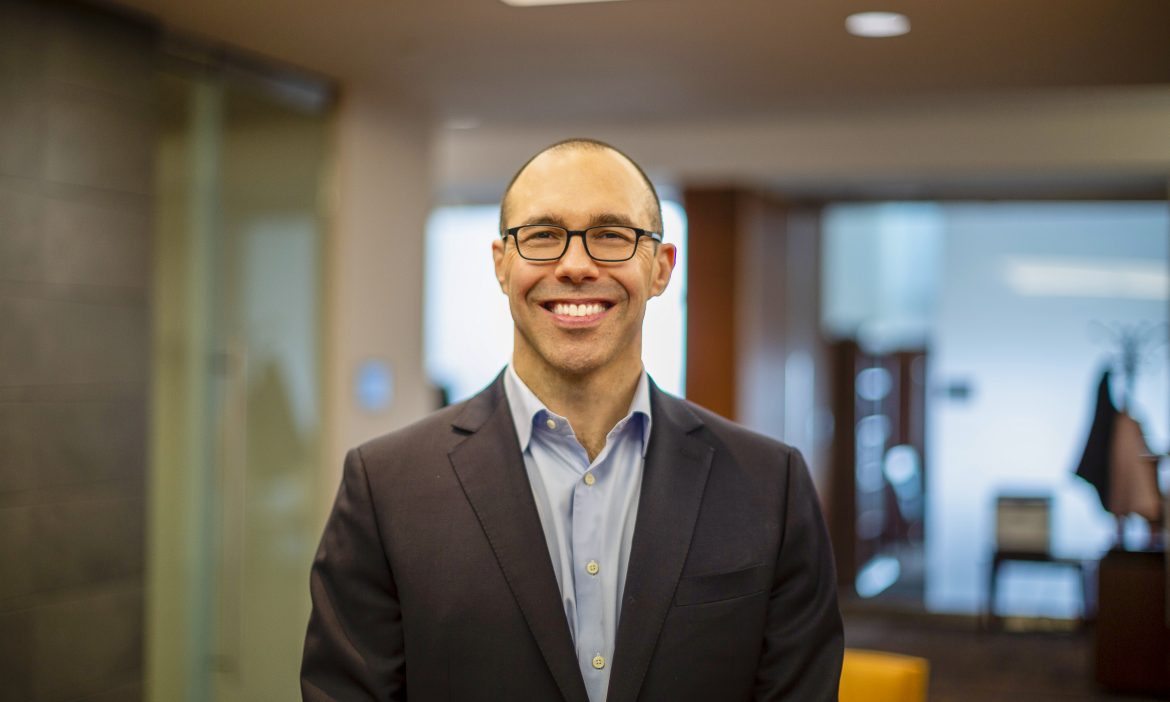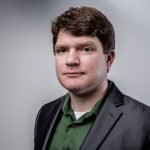Fifteen years ago, while standing in line to take his law school admission test, Bradley Leon had an epiphany.
“I saw a poster for Teach for America, a nonprofit that recruits recent college grads to teach in urban and rural communities,” Bradley recalls. “I don’t remember exactly what the poster said, but the sentiment was, ‘Not everybody has the same opportunity to be part of the solution.’ And I had enough personal experience with that to feel really drawn to it.”
Growing up in southern California before moving to Tennessee as a teenager, Bradley saw his young parents struggle to make ends meet.
“Neither of my parents went to college, and one of my earliest memories was being coached on how to talk to bill collectors when they called our house,” he says. “But my parents were great role models; they said, ‘If you want a different kind of life, the only path is through an education.’”
Though that drumbeat continued throughout his formative years, Bradley truly felt education was his calling when he saw the words on that poster.
“I decided then that I wanted to be an educator,” he says. “And the root of that passion was a desire to help people like my parents, people who’d worked really hard but just hadn’t gotten any breaks.”
Lessons taught, lessons learned
Bradley applied to Teach for America (TFA), was accepted, and moved to New Orleans to teach eighth grade language arts and social studies. It was an eye-opening experience.
“I saw that whatever challenges I faced as a kid paled in comparison to what my students were facing,” he recalls. “All of my students were Black. All of my students were receiving free and reduced meals. The level of generational poverty they were dealing with was something I thought I knew about but was on a completely different level than I had ever seen or experienced.”

These classroom experiences and the connections he made with his students would define Bradley’s career — not only as an educator, but as a forward-thinker who wanted to put policies into action.
“I’ve seen too much to know that equal opportunity in the classroom isn’t always true — but I want it to be true,” he says. “My first year with TFA, we had a great classroom year. I think 95% of my kids passed the end-of-year exam and were able to go to high school. But then 10 years later, most of my students were living the same challenging lives their parents had led.”
“A year in the classroom can be transformational; the teacher can shift the trajectory of a student or a group of students. But no single year is sufficient to give kids the opportunity they need. That made me want to be more involved in systemic change.”
Thinking bigger-picture
That involvement blossomed when Bradley was offered a TFA executive director position in Memphis, becoming chief of strategy and performance management for Shelby County Schools. While being closer to family in Tennessee certainly appealed to him — and he’d go on to meet his wife there — his new position allowed him to help students make the leap from higher education to actual career opportunities.
“A lot of times what’s happening when kids go to college is they’re accumulating tens if not hundreds of thousands of dollars in debt without picking up any marketable skills,” Bradley says. “That made me increasingly uncomfortable. I do think that if it’s either ‘All kids go to college’ or ‘Not all kids go to college,’ I would probably opt for ‘Everybody should go to college.’ So, I helped find that balance for high school graduates who were wrestling with choosing the right school and the right field and entering the workforce.”
That drive to help students find success in the working world led Bradley to BlueCross, where he’s now the executive director of the BlueSky Tennessee Institute. Established in 2021, the BlueSky Institute is an innovative partnership with East Tennessee State University (ETSU) that provides Tennessee students the opportunity to earn a bachelor’s degree in computing, one of the fastest-growing fields in the nation, and a job offer at BlueCross — all in just two years.
The program aims not just to develop much-needed technology talent but to prepare the next generation of technology leaders. Students learn on site in a new facility at the BlueCross corporate headquarters in Chattanooga and receive support and mentorship from a team of individuals who care deeply about their success. Participants aren’t obligated to accept a BlueCross job offer when they complete the program.
For Bradley, helping students find a pathway to a degree, a job and a viable career in a growing field was a win-win-win.
“When I heard about BlueSky, I thought, ‘This will change the lives of the kids who go through it, but it could also change the community, even the field of education if we make it work,’” he says. “The vision is that we want students who go through BlueSky to be the future leaders of our company. And we know the route to that is through a college education. So we want to have a degree, but we also want students to be able to earn a job along the way.”
“If we can make BlueSky successful, it’ll be a proof point for how we better link the world of education with the workforce so that kids with a college education can have an immediate job prospect that leads to a long-term career.”
Technology made sense as BlueSky’s focus since many employers having difficulty finding people with this skillset and are forced to outsource jobs. Tennessee is no exception, as Bradley points to data showing a roughly a 4-to-1 disparity in terms of jobs from employers that require an IT background compared to Tennessee college and university graduates with those degrees.
Addressing this structural mismatch also hearkens back to Bradley’s desire for students to build connections and continue moving forward.

“Putting people into meaningful careers can be a real solution for pervasive challenges like paying off student loans,” he says. “So if you’re passionate about this field, I can’t think of a better program that plugs you into an internationally accredited university like ETSU and can then put you directly into a job. And hopefully we can be a catalyst for other companies to do the same thing.”
The BlueSky Institute is now accepting applications for its first class. On-campus coursework begins this fall.
Commitments of the heart and mind
Not surprisingly, the same discipline and relentless drive toward improving the odds of real-world success for students translates to his wellbeing, too.
“I got involved in Brazilian jiu-jitsu five years ago, almost to the level of obsession,” Bradley says. “I’ll go in for classes four or five times a week. During the pandemic, my family was completely locked down and I missed a year’s worth of classes, but I have a 100-pound training dummy and mats. So I would still drill and watch instructional videos every day. I had my 9- and 5-year-old sons down there working out, as well. That training kept me sharp, which I think we all needed during that time.”

Sharpness and unwavering commitment are big part of what Bradley calls “the spiritual force” he feels on a day-to-day basis to help students.
“I want to be BlueSky students’ most committed advocate,” Bradley says. “That could entail ensuring a curriculum is dynamic. It could be ensuring we’re building the right student supports. It could be figuring out what an internship looks like. It could be recruiting. But all of it is designed around me wanting students to be successful in this program, and in their lives.”


 Jesse joined the BlueCross BlueShield of Tennessee corporate communications team in 2017. A Chattanooga native, he has more than 15 years’ experience in content creation, management, and strategy for consumer audiences, including a six-year stint in health care marketing.
Jesse joined the BlueCross BlueShield of Tennessee corporate communications team in 2017. A Chattanooga native, he has more than 15 years’ experience in content creation, management, and strategy for consumer audiences, including a six-year stint in health care marketing.